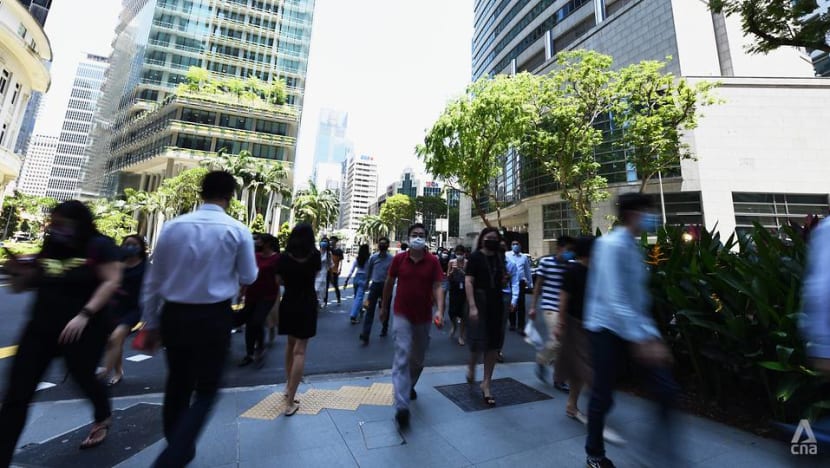National Wages Council extends wage, employment guidelines to Nov 30 amid uneven outlook

Office workers in protective face masks at Singapore's Central Business District. (File photo: Calvin Oh)
SINGAPORE: The National Wages Council (NWC) on Friday (May 14) said its latest guidelines on wage and employment-related issues will be extended until November as they “remain relevant” amid an uneven economic recovery ahead.
However, it urged employers to re-evaluate their business situations and how the guidelines would apply to them. For instance, those seeing a recovery or growth should take steps to restore wages, reward their employees fairly and bring forward hiring plans, the NWC said in an addendum to extend its 2020/2021 guidelines.
The council added that it will convene for a second time later in the year to develop guidelines for the period from Dec 1, 2021 to Nov 30, 2022, given a “dynamic and evolving” COVID-19 pandemic.
The NWC is a tripartite body made up of representatives from businesses, unions and the Government.
It usually convenes once a year to recommend guidelines on wage adjustments and other employment issues, but it met twice last year – marking only the fourth time it did so since its formation in 1972 – as the COVID-19 pandemic pummelled the economy and labour market.
READ: COVID-19: National Wages Council suggests management lead by example when cutting pay
READ: Companies may consider temporary wage cuts to minimise retrenchments: National Wages Council
In March last year, the NWC called for struggling companies considering wage cuts to have their management teams lead by example, as part of guidelines for employers to sustain their businesses and save jobs.
The council followed up with supplementary guidelines in October, which said companies that have already exhausted other cost-saving measures should consider implementing temporary wage cuts, but only to the extent needed to minimise retrenchments.
Since then, authorities have penciled in the possibility of better-than-expected growth for the Singapore economy this year - with gross domestic product (GDP) likely exceeding 6 per cent – but they have also cautioned of an uneven recovery.
Likewise for the labour market, improvements this year “may be gradual and uneven across sectors”.
READ: MAS sees continued ‘steady’ recovery in labour market, resident unemployment rate to fall further
A patchy recovery translates into uncertain prospects for some businesses, said the NWC.
Businesses continue to face increased costs brought about by the pandemic, such as higher freight and transport charges and higher operating expenses as they comply with the safety measures. Qage subsidies under the Jobs Support Scheme has also ended for many industries, and will taper off and expire in September.
“Given the current economic outlook, the 2020/2021 guidelines and supplementary guidelines remain relevant and continue to provide guidance to employers on sustaining their businesses, saving jobs, pressing on with business and workforce transformation, and recognising the contributions of the employees fairly,” the NWC said in its addendum.
Speaking to reporters at a press conference, NWC chairman Peter Seah said: “It’s not an easy call to make but looking at the situation, we felt that it is very difficult at this point in time to come up with new guidelines to help employers and workers navigate the situation.
“Perhaps by November we can have a clearer picture and we can come up with a more appropriate guideline to guide employers and employees.”
APPLY GUIDELINES ACCORDINGLY: NWC
While it is extending its guidelines, the NWC said the circumstances of many employers would have changed “significantly” compared with last year.
“All employers should re-evaluate their business situation and how the NWC guidelines would apply to them,” it said, while urging employers of unionised companies to share relevant information, such as company performance and business prospects, with the unions to facilitate wage negotiation.
READ: ‘Green shoots’ of recovery for Singapore’s economy, although uncertainties remain: Economists
For instance, employers that have done well and have good business prospects should continue to reward employees fairly through variable payments, and bring forward their hiring plans. These employers should also grant built-in basic wage increases, the council said.
For businesses seeing a recovery, they should restore wage cuts implemented earlier or roll back other cost-saving measures such as reductions in allowances and commissions. Those that have reduced basic wages should also restore these wages first, followed by the variable wage components.
As for those that continue to be badly hit by the pandemic, the NWC urged them to continue tapping on government support measures to accelerate business and workforce transformation, retain employees through appropriate cost-saving measures, as well as retrain and redeploy employees in affected business units to new jobs within the company.
If they still face significant cost pressure and poor business prospects after exhausting non-wage cost saving measures and support from the Government, they “should seek employees’ support to implement temporary wage cuts to minimise retrenchments” based on key principles in the supplementary guidelines, the NWC added.
These include the immediate implementation of the flexible wage structure - a fixed basic wage together with monthly and annual variable components - for those who have not done so, by treating any wage cuts as adjustments to a new variable component.
Unionised companies should also negotiate and agree on wage adjustments, other cost-saving measures and the implementation of the flexible wage structure, the NWC's addendum said.
In a statement expressing support for the guidelines, National Trades Union Congress (NTUC) president Mary Liew said “workers in different sectors have different expectations on their wages depending on how their industry performs”.
Ms Liew, who is also an NWC member, also called on employers to “as far as possible, endeavour to pay employees the annual wage supplement”. Doing so will help employees with seasonal expenses during a challenging period, especially for the low-wage workers.
SPECIAL CONSIDERATION FOR LOW-WAGE WORKERS
The NWC said it continues to call on all employers to “give special consideration” to low-wage workers.
To uplift wages for this group of workers, it recommends employers who have done well, or are recovering, to consider built-in wage increments. Employers who are implementing wage reductions should also implement a wage freeze for low-wage workers instead.
READ: Tripartite workgroup agrees to extend progressive wage model to food services, retail sectors: Zaqy Mohamad
The NWC is also working with the tripartite workgroup on lower-wage workers, which will be releasing its recommendations later this year on how to cover more low-wage workers under the progressive wage model.
“The NWC aims to incorporate the (tripartite workgroup’s) recommendations … into the 2021/2022 guidelines,” it said.
Speaking at the same press conference, the labour movement’s deputy secretary-general Koh Poh Koon said low-wage workers are a vulnerable group that has borne a larger share of the pandemic's impact.
“So a principle we want to emphasise is that this group of workers should be the last to get any cuts, and the first to get any restoration or increment”, he said, adding that there is already "a significant wage gap" between those in the bottom 20 per cent and the rest of the workforce.
“This is the time for us to actually play catch-up and not have them lag behind even further.”
The Government said it has accepted the NWC’s recommendation to extend its guidelines, and will continue to work with tripartite partners “to secure the rebound and support businesses and workers to emerge stronger” from the COVID-19.
The Manpower Ministry’s permanent secretary Aubeck Kam said the current guidelines “already build in a lot of flexibility to deal with a whole range of scenarios”.
“By and large if you look at the record of last year, employers and workers worked very well together to protect jobs – you see that in the strength and resilience of local employment numbers,” Mr Kam told reporters at the press conference.
“I think that’s a good sign. It shows that the recommendations and guidelines that were handed out last year are quite effective and fit for purpose.”
ON FLEXIBLE WAGE SYSTEM
The Government, in its media statement, also said it encourages every employer to implement the flexible wage system if they have not done so.
This system will give them the “necessary flexibility” to navigate economic uncertainty, increase job security for employees and ensure that wages are fairly and more quickly restored in tandem with eventual business recovery, it added.
Singapore National Employers’ Federation (SNEF) president Robert Yap said more will have to be done to nudge employers to take on the flexible wage system, which can act “as a cushion for ups and downs”.
Only 29.3 per cent of workers here were employed by companies using the system up until 2019 and the figure “has not increased a lot” since then, he added.
“More emphasis needs to be done, together with the union, to make companies truly adopt the flexible wage system so that we can then withstand all these shocks and we know, that ups and downs are going to be more frequent,” said Mr Yap, who is a NWC member.
NTUC's Ms Liew said the unions will continue to work with its partners on this. So far, one in every two unionised companies have a variable wage component for their employees’ salaries.












